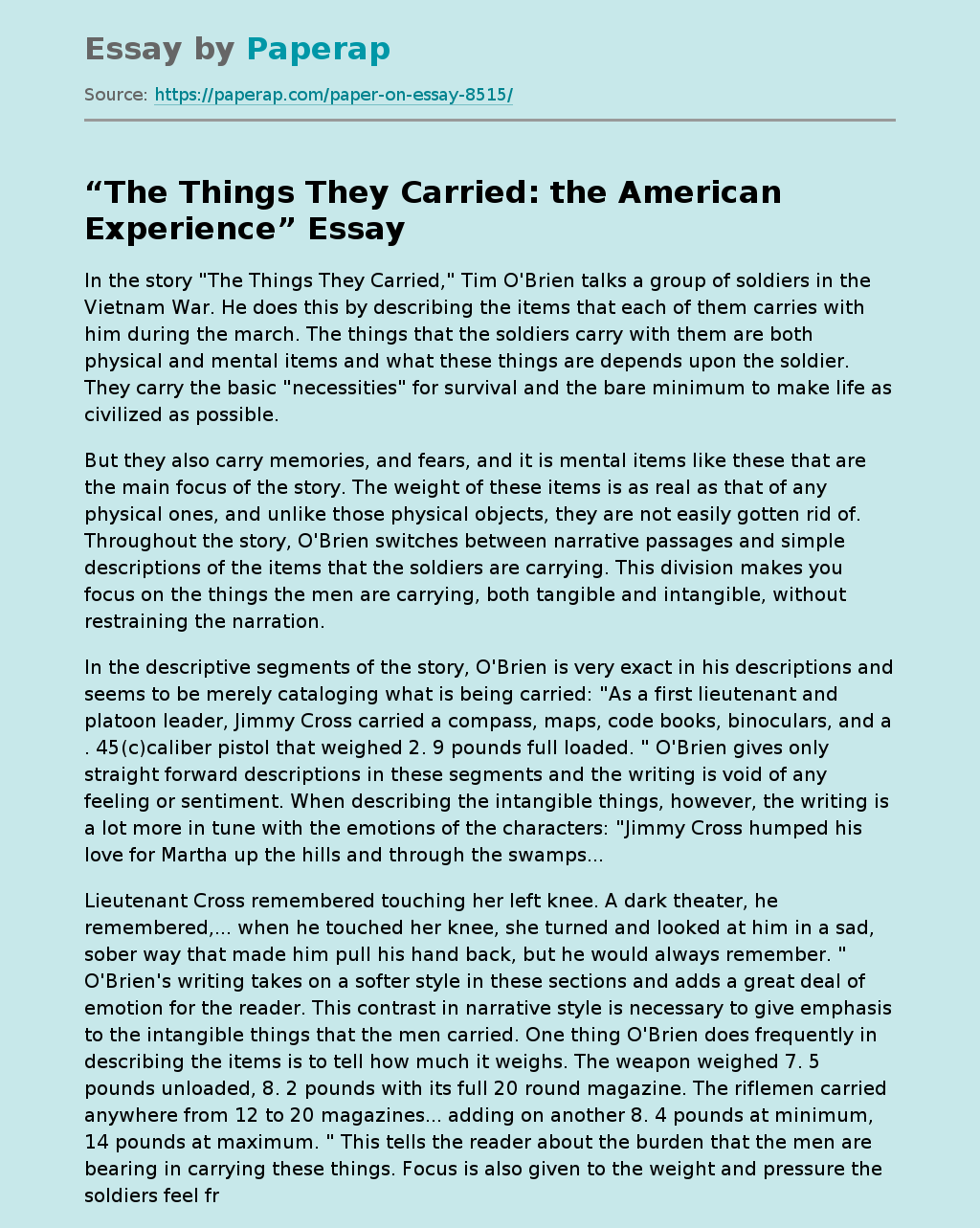“The Things They Carried” by Tim O'Brien
In the story “The Things They Carried,” Tim O’Brien talks a group of soldiers in the Vietnam War. He does this by describing the items that each of them carries with him during the march. The things that the soldiers carry with them are both physical and mental items and what these things are depends upon the soldier. They carry the basic “necessities” for survival and the bare minimum to make life as civilized as possible.
But they also carry memories, and fears, and it is mental items like these that are the main focus of the story.
The weight of these items is as real as that of any physical ones, and unlike those physical objects, they are not easily gotten rid of. Throughout the story, O’Brien switches between narrative passages and simple descriptions of the items that the soldiers are carrying. This division makes you focus on the things the men are carrying, both tangible and intangible, without restraining the narration.
In the descriptive segments of the story, O’Brien is very exact in his descriptions and seems to be merely cataloging what is being carried: “As a first lieutenant and platoon leader, Jimmy Cross carried a compass, maps, code books, binoculars, and a . 45(c)caliber pistol that weighed 2. 9 pounds full loaded. ” O’Brien gives only straight forward descriptions in these segments and the writing is void of any feeling or sentiment. When describing the intangible things, however, the writing is a lot more in tune with the emotions of the characters: “Jimmy Cross humped his love for Martha up the hills and through the swamps.
Lieutenant Cross remembered touching her left knee. A dark theater, he remembered,… when he touched her knee, she turned and looked at him in a sad, sober way that made him pull his hand back, but he would always remember. ” O’Brien’s writing takes on a softer style in these sections and adds a great deal of emotion for the reader. This contrast in narrative style is necessary to give emphasis to the intangible things that the men carried. One thing O’Brien does frequently in describing the items is to tell how much it weighs.
The weapon weighed 7. 5 pounds unloaded, 8. 2 pounds with its full 20 round magazine. The riflemen carried anywhere from 12 to 20 magazines… adding on another 8. 4 pounds at minimum, 14 pounds at maximum. ” This tells the reader about the burden that the men are bearing in carrying these things. Focus is also given to the weight and pressure the soldiers feel from what they’re carrying and from external forces, such as nature. “They carried the sky. The whole atmosphere… they carried gravity.
But the greatest weight the men feel comes from nothing they can physically carry, but rather their emotions: “Grief, terror, love, longing these were mental burdens, but the mental problems had their own specific gravity, they had tangible weight. ” These emotional burdens are the heaviest because they are in your head and therefore cannot be disposed of. Physical burdens can be discarded. Emotional burdens, on the other hand, must be endured. O’Brien, speaking of cowardice in particular, says, “In many respects this was the heaviest burden of all, for it could never be put down.
The soldiers know there is no easy way to rid themselves of their fears because of their abstract nature, but they dream escapist dreams of flying away in a plane and “falling higher and higher,” free of weight. Jimmy Cross tries to rid himself of intangible burdens by disposing of tangible ones that, to him, represent intangible qualities. He does this by burning his letters from Martha. He knows, though, that this simple act cannot rid him of his memories. “He realized it was only a sign.
Besides, the letters were in his head. ” His love for Martha is also represented by the small pebble, which she gave him, but the easily disposable pebble, which weighs merely an ounce, represents a much heavier emotional burden that he cannot rid himself of. Cross attempts this to try to better himself as a soldier, but O’Brien leaves it up in the air as to whether he accomplishes this. We can infer, however, from earlier statements that he will never be completely freed from the love he carries.
The soldiers in “The Things They Carried” carried many things with them on their march. All of the things they carried were a great burden, but none more so than their emotions. All of them carry great loads of memories, fears, and desires. These intangible objects are an essential part of them and therefore cannot be put down, but carried and endured. And as Jimmy Cross comes to realize, “It was very sad… the things men carried inside”.
“The Things They Carried” by Tim O'Brien. (2017, Feb 27). Retrieved from https://paperap.com/paper-on-essay-8515/

